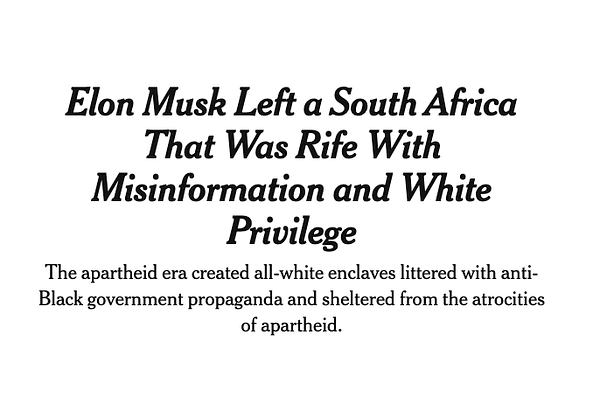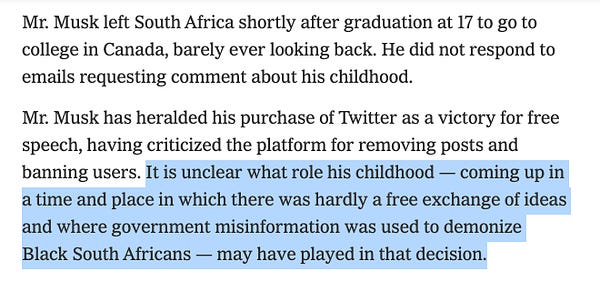Weekend reads
Another week of distressing developments and pure, unfiltered partisan hostility (plus: "unchecked speech," "vulva owners" - and lots of Elon Musk)
Here we are at the end of another week in the culture wars, with yet another news cycle packed with distressing developments and pure, unfiltered partisan hostility.
The leak of the Supreme Court draft opinion on Roe v. Wade has turbocharged the battle between left and right, pouring more gasoline on an already raging fire, and exposing rampant hypocrisy on both sides. (Fuelling jokes, at least. Laugh or cry!)

This dumpster fire of a news week also saw my favourite comedian attacked on stage in Hollywood (Dave Chappelle reportedly had a quiet talk with his assailant afterwards), a polarized debate on student loan debt forgiveness, and a train wreck of a trial starring Johnny Depp and Amber Heard.
Add to all of that, America’s stranger-than-fiction Mary Poppins Minister of Truth — who became head of the Department of Homeland Security’s new Disinformation Governance Board in a move conveniently timed to the April 22 release of her book, How to Be a Woman Online — is walking back previous comments about the Hunter Biden laptop story, which, as we know, has been verified by The New York Times.
Speaking of The New York Times. It’s hard to imagine what its editors were thinking when they ran the paper’s hit piece on Elon Musk this week.
Make no mistake, Musk is fair game for criticism; he’s a public person with extraordinary wealth, power, and influence. I am not invested in defending him.
But I am invested in good journalism, and this wasn’t that.
The piece, “Elon Musk Left a South Africa That Was Rife With Misinformation and White Privilege,” advances an odd premise — that since Elon Musk grew up in apartheid South Africa, he is … what? Somehow culpable?
This reasoning would be bizarre enough on its own. (Since when are children morally responsible for their government’s appalling policies?)
But adding to the incomprehensibility, the facts in the piece contradict the implication that Musk is complicit with racism, at pretty much every turn.


We learn, for instance, that Musk’s father was an anti-apartheid politician, that his family did not buy into negative propaganda about freedom fighters, and that Musk and his siblings questioned their father about apartheid laws. “As far as being sheltered from it, that’s nonsense. They were confronted by it every day,” Errol Musk told The New York Times. “They didn’t like it.”
We learn, too, that Musk had Black friends, that he chided a white classmate for using an anti-Black slur and was bullied for it. We learn that when a Black friend passed away, he went to his rural village for the funeral, an act “unheard of during the time.”
We are also told, via a biography of Elon Musk, that “Mr. Musk said he did not want to partake in South Africa’s mandatory military service because it would have forced him to participate in the apartheid regime — and that may have contributed to his decision to leave South Africa shortly after high school graduation.”
Any reasonable reader taking in this information would come away with the conclusion that Elon Musk was, in fact, against apartheid.
So, what is the point of this piece? This, apparently:
Mr. Musk has heralded his purchase of Twitter as a victory for free speech, having criticized the platform for removing posts and banning users. It is unclear what role his childhood — coming up in a time and place in which there was hardly a free exchange of ideas and where government misinformation was used to demonize Black South Africans — may have played in that decision.
But what does that even mean?



In the end, we have to go to Twitter to find a straightforward articulation of the key argument being made here, from reporter John Eligon — and that is that “Elon Musk grew up in a South Africa that saw the dangers of unchecked speech.”
This attempt to conflate government propaganda with “unchecked speech” is, as human rights lawyer Jacob Mchangama has pointed out, “wildly inaccurate and misleading” (and his thread on censorship, free speech and apartheid is a must read). Government censorship is obviously not free speech.


All of this begs the question: Why is The New York Times so invested in the narrative that free speech is dangerous?





I remember fondly the days in the past where I lamented the growing liberal bias in my daily news. What we have today is not that. What we have today is full on left political attack propaganda that does not resemble any form of real journalism except as defined by Goebbels.
I cancelled my 40 years subscription to the Grey Lady at the beginning of the year. AM Rosenthal is spinning in his grave.